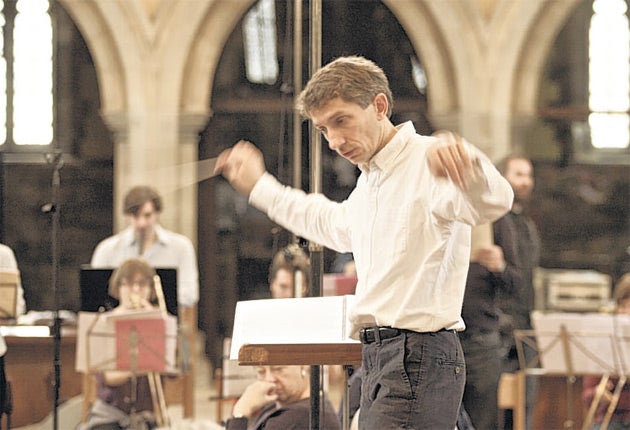Biggio time beckons for Striggio
It's no surprise that a 16th-century Mass has hit the pop charts, says Jessica Duchen – spiritual music always helps in tough times

Your support helps us to tell the story
From reproductive rights to climate change to Big Tech, The Independent is on the ground when the story is developing. Whether it's investigating the financials of Elon Musk's pro-Trump PAC or producing our latest documentary, 'The A Word', which shines a light on the American women fighting for reproductive rights, we know how important it is to parse out the facts from the messaging.
At such a critical moment in US history, we need reporters on the ground. Your donation allows us to keep sending journalists to speak to both sides of the story.
The Independent is trusted by Americans across the entire political spectrum. And unlike many other quality news outlets, we choose not to lock Americans out of our reporting and analysis with paywalls. We believe quality journalism should be available to everyone, paid for by those who can afford it.
Your support makes all the difference.It's not the first thing you'd expect to see in the pop charts alongside Bon Jovi and Duffy: a choral work in 40 parts by a composer little recognised beyond the ivory towers of early music.
Yet the world premiere recording of the Mass Ecco sì beato giorno, written in 1566 by the Italian composer Alessandro Striggio (c1536-1592) but long thought lost, has rocketed up the sales ratings since its release earlier this month. It was the No 1 classical download on iTunes and it has reached No 68 on the pop charts. The CD, recorded by the British vocal ensemble I Fagiolini hit the top of the specialist classical chart and was hot on the heels of André Rieu on the general one. What on earth is going on?
It's not the first time that an unlikely-sounding classical release has met with such startling success. Back in 1992, Henryk Górecki's Third Symphony, The Symphony of Sorrowful Songs, a lengthy contemporary work of tremendous gloom, became a surprise hit. But it was the right music at the right time. Back then, Britain was trying to haul itself out of recession and Black Wednesday had forced it out of the ERM; there was a war in the Balkans, the housing market had gone through the floor and people were fed up and miserable. Górecki's music hit a nerve, articulating something in our state of mind better than words could.
And now? The earthquake disaster in Japan, revolutions in the Middle East and potential civil war in Libya; at home, rocketing prices and high anxiety about cuts. Long gone are the Spice Girls and the days of Cool Britannia. Nobody's in the mood for all that forced, noisy jollity.
So we decide we like... Striggio? Yes, because this is music that evokes another world in sound, one that is calm, spiritual, balanced and drenched in Italian sunshine. It is not too complex harmonically and it's probably only a matter of time before someone decides to dismiss it as aural wallpaper; still, it seems to be striking a chord with many, many listeners. The Mass's companion pieces on the album are Thomas Tallis's 40-part motet Spem in allium and Striggio's motet Ecce beatam lucem; and hearing so much vibrant music – sumptuous in texture yet remarkably pure-sounding – is cheaper than therapy and more soothing to a tired brain than Eminem.
If you've ever turned to music in a crisis, you'll know its power. When my mother died, I couldn't listen to anything but Bach for weeks – only the St Matthew Passion would do. And after my late sister was diagnosed with terminal cancer, she told me that she had lost the capacity to listen to music, but for the Mozart Requiem. Music works on us at a profound level; difficult times can bend our tastes for spiritual sustenance in unexpected directions.
Throughout the financial crisis in the UK, audiences for the arts have stayed amazingly buoyant. There are plenty of theories about this. Cost is among them: a trip to the theatre will set you back less than a week in the Costa del Cashflow and might offer better escapism. Classical concerts in particular are a relatively cheap night out. As for Striggio, you can download the new album for £7.99. But that's not all there is to it.
Many of us have been forced to take stock recently, reassessing how we live and what we can expect from life in the years ahead. Hearing good music is one of the most enriching, enlivening experiences available to us, and this is the time to remember that. And there are few finer antidotes to the aural dross that assaults us most of the time than a bit of Renaissance polyphony. Built on carefully wrought principles involving architectural proportion, the interaction of the voices and vivid word-settings, Renaissance music was effectively the starting point for the development of Western music in the following centuries. If we need to reassert the foundations for life, no wonder we turn to the foundations of music. Now we can do so in surround sound.
The release marks I Fagiolini's 25th anniversary. Now they'll have much more than a birthday party to enjoy on their current tour: hopefully the success of this release will leave them a bean or two better off.
I Fagiolini are now touring the UK and will perform Bach at the Queen Elizabeth Hall, London SE1 (0844 875 0073) on 25 and 27 March. The CD and DVD of Striggio's Mass in 40 Parts are out on Decca.
Join our commenting forum
Join thought-provoking conversations, follow other Independent readers and see their replies
Comments